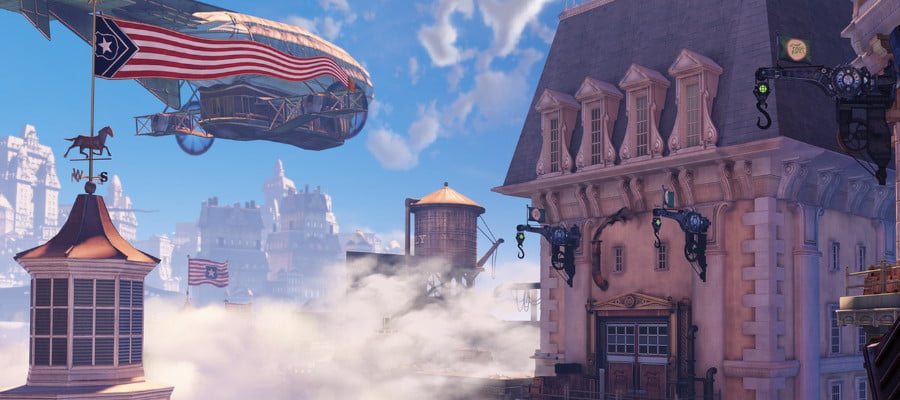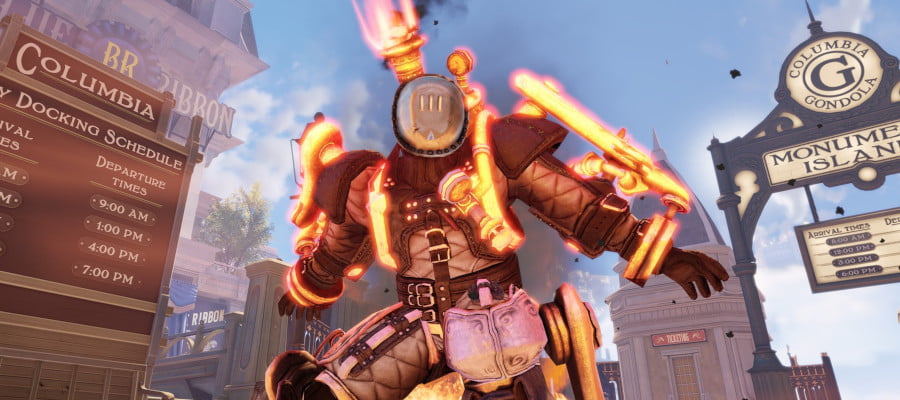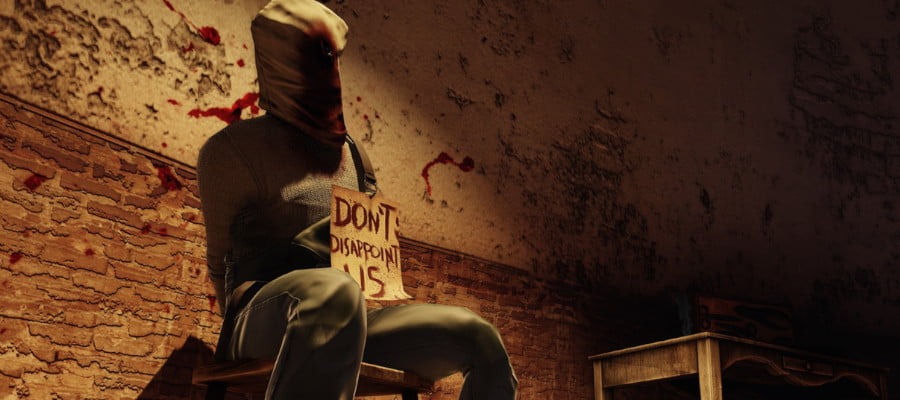When I wrote about Bioshock Infinite back in May of 2013, I had just started university and had some fantasy in my mind about this blog being a bridge to working in the games industry. James journalism, I imagined, was waiting for me to present an example of what I could do, and so, I wrote about games with the energy of someone trying to reach that sweet spot of irreverent professionalism, discussing games in terms of pros and cons and the inevitable consideration of a consumer.
At the time I did call the game a modern classic, on par with Spec Ops: The Line. I cringe at that a little, because while it’s true, it’s true in the way that you could remove that description from context and leave with the impression that I think that makes it good. It’s absolutely a classic – you can look at it in the context of the games of its time and it serves as an iconic reduction of so many of the elements that make up what it was to be games in that time and that place.
I then spent several years familiarising myself further and further with Bioshock Infinite and realising how much worse a game it was than I appreciated at the time. I eventually came to refer to Bioshock Infinite as a ‘shallow game as high watermark.’ That’s reasonable, I think — It does deserve to be regarded as a classic because of it. It was very much a good example of what gaming, at the time, considered The Way Things Should Be, that it was an example of art as a game.
It’s 2023 now.
I resolved the idea that I should be kind with energy, and cruel with purpose. The purpose here, is to look at my own writing, ten years ago, about this game, and see what I think of it, what I think of who I am now.
I did make a lot of assumptions about games at the time. I did fancy myself more of an expert than I was and am — I said Dishonored was developed faster than Bioshock Infinite, which I literally do not know how I could know. Even if we imagine I did know it, though, even if I was right, the question follows: So fucking what?
I started using terminology here that I still use somewhat; I referred to the level design as fightboxes, a term I use to describe the same kind of game design that sees combats as things to break out in arenas. The nature of Bioshock Infinite as a fightbox game isn’t really a mark for or against it; it does make the world feel less whole and real the way that linear path of the game closes off behind you kind of encourages a speedy pace the game doesn’t do a good job of using. Plus, if the main way you engage with the game is with its little boxes of fighting between cutscenes, it highlights the guns being boring.
I definitely had Feelings About Booker. I think part of it was the opening chainsawing of a racist cop, and the very real-feeling way I wanted to run through the game and kill everything to rescue Elizabeth that he echoed. I liked the feeling of being a rundown ramshackle mess of a dude who screwed up, related to violence, and could only think of ways to deploy that violence to the world. It jived with me, what can I say. But what sucks about Booker, by the end, is the realisation that he’s just giving up on his situation: He’s not bothering to get good at that relationship to violence, he’s not understanding what violence is or how it relates to people at large.
It was Burial At Sea that broke me though, that made me finally realise what I was looking at, and perhaps realise I was making excuses for this game. I was seeing this as a Serious Game that needed to be taken Seriously, and therefore my criticism had to come in terms of these really specific, narrow places, like I had to try and divine a correct opinion out of the experience. Now I’m much more free to say the story’s pretentious and shit and racist and pretty misogynist, and those aren’t ideas that need explaining from first principle as if everyone is a good faith interlocutor.
Thing is, I was buying into myths. The myth is not that games weren’t doing this kind of thing. Games have been doing this kind of thing for as long as they’ve been making games. Games are always going to have people trying weird stuff, stuff about expressing ideas that are difficult to express in any other way. The year Bioshock Infinite launched, there were a thousand more interesting art games being made and released and shared and played. Itch.io had already launched in March 2013, there were already whole markets of games being weird and interesting and meta-aware and engaging and artistic.
But they didn’t look like Bioshock Infinite. They weren’t released like it. They weren’t presented and platformed and distributed like a AAA product. The myth was that Bioshock Infinite did a single thing new. Even the ways it sucks are boring and old. It’s not even a new sin, just the same old sins, over and over again.
I feel bad, reading back to my old Bioshock Infinite writing about how I missed a point that I feel is incredibly obvious to start with, an idea that I now, very much hold to be obviously true: Violence in response to violence is not a bad thing. If you are being oppressed, you do not solve that oppression by not being violent. When the revolution arc of Bioshock Infinite presents the slavers being hunted and killed by their slaves, and tries to frame it as ‘going too far’ I should have realised how obviously stupid that is. Those people were complicit in, participants in, a terrible, dreadful crime, and they have it coming. There’s a safe place for those people and it’s on the side of the revolutionaries fighting against slavers.
There was a forking pair of roads before me, as expressed in Bioshock Infinite opinions, and one of them got more radical and more okay with violence and the other might have kept trying for that Games Journalism job that would vaporise the next time the Libs got in charge and decided to randomly defund the games industry in this country. The opinions I had about a game that I didn’t dislike that much got worse and worse the further I got from them, the more I formed new opinions, informed by knowing more, and knowing better, and being more honest with myself, and more willing to foreground that honesty about myself.
I think violence is a reasonable response to oppression.
I think, now, that surely, I didn’t like this game. Surely I wasn’t that into Bioshock Infinite, I remember being critical of it for ages! But that criticality comes with a bunch of wallpaper, and at the time, there’s definitely a bunch of stuff I missed. The racism element of the game, where slavery seen as bad, but ending slavery is also seen as bad, that whole deep dose of liberal centrist bullshit that feeds into dad fantasies, all that stuff that I disdain so hard now, at the time, I didn’t quite appreciate.
At the time, I thought ill of the game for its cludgy movement, the way the plot left me bored, and the flashes of times when the game, telling me what it wanted to be about, what it cared about, those were the problems, those should erode its place as a classic. The way I summarise it nowadays is that Bioshock Infinite is a game that lets me chainsaw a racist cop in the face in the opening act, and it gets less good from there. I think now, I’m a lot better at grasping what it means to like a game, and approaching a game on its own terms, and then examining what those terms mean.
Like, Bioshock Infinite is a game about a sad dad failing to connect to his daughter who’s so amazing she’ll die to save his life from the harm he inflicted on her. It’s a game about Americana and guns and the Civil War and classic dad music and it’s just soaking in the great, burning need to please tell me that I matter, while also, please don’t tell me I have to change what I am. It’s a game where being a dead man is better than being a good dad. Where this game has an author, a singular voice, he is a white bearded dude who has a lovely aesthetic sense and terrible, terrible opinions, the white-guy politicking centrality that speaks the sublimated fear that I know I have it coming.
Bioshock Infinite is a classic game, and that should be seen as deeply embarrassing.



1 Trackback